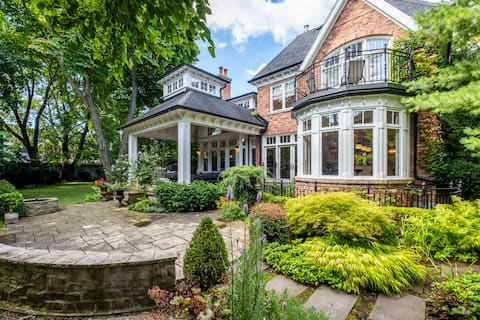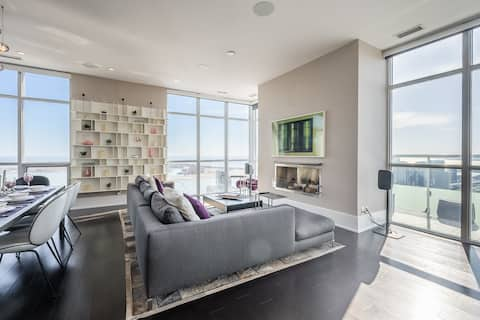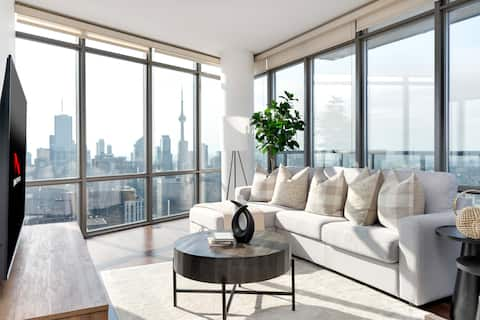Toronto Airbnb Market Analysis 2025: Short Term Rental Data & Vacation Rental Statistics in Ontario, Canada
Is Airbnb profitable in Toronto in 2025? Explore comprehensive Airbnb analytics for Toronto, Ontario, Canada to uncover income potential. This 2025 STR market report for Toronto, based on AirROI data from April 2024 to March 2025, reveals key trends in the bustling market of 9,925 active listings.
Whether you're considering an Airbnb investment in Toronto, optimizing your existing vacation rental, or exploring rental arbitrage opportunities, understanding the Toronto Airbnb data is crucial. Navigating the high regulation landscape is key to maximizing your short term rental income potential. Let's dive into the specifics.
Key Toronto Airbnb Performance Metrics Overview
Monthly Airbnb Revenue Variations & Income Potential in Toronto (2025)
Understanding the monthly revenue variations for Airbnb listings in Toronto is key to maximizing your short term rental income potential. Seasonality significantly impacts earnings. Our analysis, based on data from the past 12 months, shows that the peak revenue month for STRs in Toronto is typically May, while February often presents the lowest earnings, highlighting opportunities for strategic pricing adjustments during shoulder and low seasons. Explore the typical Airbnb income in Toronto across different performance tiers:
- Best-in-class properties (Top 10%) achieve $6,153+ monthly, often utilizing dynamic pricing and superior guest experiences.
- Strong performing properties (Top 25%) earn $3,728 or more, indicating effective management and desirable locations/amenities.
- Typical properties (Median) generate around $1,899 per month, representing the average market performance.
- Entry-level properties (Bottom 25%) see earnings around $893, often with potential for optimization.
Average Monthly Airbnb Earnings Trend in Toronto
Toronto Airbnb Occupancy Rate Trends (2025)
Maximize your bookings by understanding the Toronto STR occupancy trends. Seasonal demand shifts significantly influence how often properties are booked. Typically, Augustsees the highest demand (peak season occupancy), while March experiences the lowest (low season). Effective strategies, like adjusting minimum stays or offering promotions, can boost occupancy during slower periods. Here's how different property tiers perform in Toronto:
- Best-in-class properties (Top 10%) achieve 90%+ occupancy, indicating high desirability and potentially optimized availability.
- Strong performing properties (Top 25%) maintain 76% or higher occupancy, suggesting good market fit and guest satisfaction.
- Typical properties (Median) have an occupancy rate around 52%.
- Entry-level properties (Bottom 25%) average 25% occupancy, potentially facing higher vacancy.
Average Monthly Occupancy Rate Trend in Toronto
Average Daily Rate (ADR) Airbnb Trends in Toronto (2025)
Effective short term rental pricing strategy in Toronto involves understanding monthly ADR fluctuations. The Average Daily Rate (ADR) for Airbnb in Toronto typically peaks in July and dips lowest during February. Leveraging Airbnb dynamic pricing tools or strategies based on this seasonality can significantly boost revenue. Here's a look at the typical nightly rates achieved:
- Best-in-class properties (Top 10%) command rates of $290+ per night, often due to premium features or locations.
- Strong performing properties (Top 25%) achieve nightly rates of $183 or more.
- Typical properties (Median) charge around $106 per night.
- Entry-level properties (Bottom 25%) earn around $64 per night.
Average Daily Rate (ADR) Trend by Month in Toronto
Get Live Toronto Market Intelligence 👇

Explore Real-time Analytics
Airbnb Seasonality Analysis & Trends in Toronto (2025)
Peak Season (May, June, April)
- Revenue averages $3,469 per month
- Occupancy rates average 49.5%
- Daily rates average $155
Shoulder Season
- Revenue averages $2,891 per month
- Occupancy maintains around 55.8%
- Daily rates hold near $154
Low Season (January, February, March)
- Revenue drops to average $1,798 per month
- Occupancy decreases to average 41.9%
- Daily rates adjust to average $136
Seasonality Insights for Toronto
- The Airbnb seasonality in Toronto shows moderate seasonality with distinct peak and low periods. While the sections above show seasonal averages, it's also insightful to look at the extremes:
- During the high season, the absolute peak month showcases Toronto's highest earning potential, with monthly revenues capable of climbing to $3,589, occupancy reaching a high of 62.9%, and ADRs peaking at $158.
- Conversely, the slowest single month of the year, typically falling within the low season, marks the market's lowest point. In this month, revenue might dip to $1,687, occupancy could drop to 40.0%, and ADRs may adjust down to $134.
- Understanding both the seasonal averages and these monthly peaks and troughs in revenue, occupancy, and ADR is crucial for maximizing your Airbnb profit potential in Toronto.
Seasonal Strategies for Maximizing Profit
- Peak Season: Maximize revenue through premium pricing and potentially longer minimum stays. Ensure high availability.
- Low Season: Offer competitive pricing, special promotions (e.g., extended stay discounts), and flexible cancellation policies. Target off-season travelers like remote workers or budget-conscious guests.
- Shoulder Seasons: Implement dynamic pricing that balances peak and low rates. Target weekend travelers or specific events. Offer slightly more flexible terms than peak season.
- Regularly analyze your own performance against these Toronto seasonality benchmarks and adjust your pricing and availability strategy accordingly.
Best Areas for Airbnb Investment in Toronto (2025)
Exploring the top neighborhoods for short-term rentals in Toronto? This section highlights key areas, outlining why they are attractive for hosts and guests, along with notable local attractions. Consider these locations based on your target guest profile and investment strategy.
| Neighborhood / Area | Why Host Here? (Target Guests & Appeal) | Key Attractions & Landmarks |
|---|---|---|
| Downtown Toronto | The bustling heart of the city, offering prime access to entertainment, dining, and shopping. Ideal for tourists seeking a vibrant urban experience with easy access to attractions. | CN Tower, Ripley's Aquarium, Royal Ontario Museum, Toronto Eaton Centre, St. Lawrence Market |
| Queen Street West | A trendy neighborhood known for its eclectic shops, art galleries, and vibrant nightlife. Popular among young travelers and creatives looking for a unique experience. | Graffiti Alley, Trendy boutiques, Art galleries, Bars and restaurants, Music venues |
| Yorkville | Toronto's upscale neighborhood featuring luxury shopping and fine dining. A prime location for travelers seeking an affluent experience close to cultural sites. | Bata Shoe Museum, Royal Ontario Museum, Yorkville Village, High-end boutiques, Art galleries |
| Kensington Market | An eclectic and bohemian neighborhood known for its market, vintage shops, and multicultural food scene. Attracts adventurous travelers seeking a unique local experience. | Kensington Market, Street art, Food vendors, Vintage shops, Cafés |
| The Beaches | A scenic neighborhood along Lake Ontario, known for its beautiful beaches and relaxed vibe. Great for families and vacationers looking for outdoor activities. | Woodbine Beach, Kew Gardens, Boardwalk, Lakeshore bike path, The Beaches boardwalk |
| Distillery District | A historic area known for its well-preserved Victorian industrial architecture and vibrant arts scene. Attracts visitors interested in culture and craft beverages. | Distillery Historic District, Art galleries, Craft distilleries, Restaurants, Festivals |
| Cabbagetown | A charming neighborhood known for its historic homes and local parks. Ideal for travelers looking for a quieter, residential feel with access to local amenities. | Riverdale Park, Cabbagetown Heritage Conservation District, Local cafes, Cabbagetown Festival, Parks |
| Distillery District | A well-known historical area filled with shops, restaurants, and art galleries, perfect for tourists who enjoy culture and artisan goods. | Distillery Historic District, Art galleries, Craft breweries, Restaurants, Cultural events |
Understanding Airbnb License Requirements & STR Laws in Toronto (2025)
Yes, Toronto, Ontario, Canada enforces high STR regulations. Obtaining a license and ensuring compliance is almost certainly required according to current 2025 STR laws. Always verify the latest short term rental regulations and Airbnb license requirements directly with local government authorities for Toronto to ensure full compliance before hosting.
(Source: AirROI data, 2025, based on 56% licensed listings)
Top Performing Airbnb Properties in Toronto (2025)
Benchmark your potential! Explore examples of top-performing Airbnb properties in Torontobased on Trailing Twelve Month (TTM) revenue. Analyze their characteristics, revenue, occupancy rate, and ADR to understand what drives success in this market.

Classy modern farmhouse, Private Estate Oasis
Entire Place • 6 bedrooms

Ultra-Modern 4BR Home with Pool, Gym & Theatre
Entire Place • 5 bedrooms

Grand & Luxurious Historic Home | Central Toronto
Entire Place • 6 bedrooms

Award Winning 3BR Luxury Penthouse -Stunning Views
Entire Place • 3 bedrooms

Yorkville Sanctuary Private Villa
Entire Place • 3 bedrooms

Sub-Penthouse Unit Best View of City w/ CN Tower!
Entire Place • 3 bedrooms
Note: Performance varies based on location, size, amenities, seasonality, and management quality. Data reflects the past 12 months.
Top Performing Airbnb Hosts in Toronto (2025)
Learn from the best! This table showcases top-performing Airbnb hosts in Toronto based on the number of properties managed and estimated total revenue over the past year. Analyze their scale and performance metrics.
| Host Name | Properties | Grossing Revenue | Stay Reviews | Avg Rating |
|---|---|---|---|---|
| Sonder (Toronto) | 29 | $994,442 | 1508 | 4.59/5.0 |
| Julie | 30 | $695,763 | 1151 | 3.81/5.0 |
| Vladimir | 1 | $483,349 | 20 | 5.00/5.0 |
| Babak | 1 | $470,375 | 5 | 5.00/5.0 |
| Lu | 14 | $422,616 | 381 | 4.51/5.0 |
| Yimin | 14 | $405,522 | 92 | 4.61/5.0 |
| Vivek | 14 | $352,919 | 293 | 3.52/5.0 |
| AirNite Stays | 5 | $342,123 | 193 | 4.58/5.0 |
| James | 9 | $339,126 | 906 | 4.93/5.0 |
| Sharon | 28 | $334,254 | 493 | 4.56/5.0 |
Analyzing the strategies of top hosts, such as their property selection, pricing, and guest communication, can offer valuable lessons for optimizing your own Airbnb operations in Toronto.
Dive Deeper: Advanced Toronto STR Market Data (2025)
Ready to unlock more insights? AirROI provides access to advanced metrics and comprehensive Airbnb data for Toronto. Explore detailed analytics beyond this report to refine your investment strategy, optimize pricing, and maximize your vacation rental profits.
Explore Advanced MetricsToronto Short-Term Rental Market Composition (2025): Property & Room Types
Room Type Distribution
Property Type Distribution
Market Composition Insights for Toronto
- The Toronto Airbnb market composition is heavily skewed towards Entire Home/Apt listings, which make up 66.7% of the 9,925 active rentals. This indicates strong guest preference for privacy and space.
- However, a notable 32.9% share for Private Rooms suggests opportunities for budget-conscious travelers or hosts renting out spare rooms.
- Looking at the property type distribution in Toronto, Apartment/Condo properties are the most common (46.9%), reflecting the local real estate landscape.
- Houses represent a significant 45% portion, catering likely to families or larger groups.
- Smaller segments like hotel/boutique, unique stays (combined 1.6%) offer potential for unique stay experiences.
Toronto Airbnb Room Capacity Analysis (2025): Bedroom Distribution
Distribution of Listings by Number of Bedrooms
Room Capacity Insights for Toronto
- The dominant room capacity in Toronto is 1 bedroom listings, making up 44.3% of the market. This suggests a strong demand for properties suitable for couples or solo travelers.
- Together, 1 bedroom and 2 bedrooms properties represent 64.5% of the active Airbnb listings in Toronto, indicating a high concentration in these sizes.
Toronto Vacation Rental Guest Capacity Trends (2025)
Distribution of Listings by Guest Capacity
Guest Capacity Insights for Toronto
- The most common guest capacity trend in Toronto vacation rentals is listings accommodating 2 guests (28.3%). This suggests the primary traveler segment is likely couples or solo travelers.
- Properties designed for 2 guests and 4 guests dominate the Toronto STR market, accounting for 46.4% of listings.
- 12.9% of properties accommodate 6+ guests, serving the market segment for larger families or group travel in Toronto.
- On average, properties in Toronto are equipped to host 2.8 guests.
Toronto Airbnb Booking Patterns (2025): Available vs. Booked Days
Available Days Distribution
Booked Days Distribution
Booking Pattern Insights for Toronto
- The most common availability pattern in Toronto falls within the 271-366 days range, representing 37.2% of listings. This suggests many properties have significant open periods on their calendars.
- Approximately 67.6% of listings show high availability (181+ days open annually), indicating potential for increased bookings or specific owner usage patterns.
- For booked days, the 91-180 days range is most frequent in Toronto (30.3%), reflecting common guest stay durations or potential owner blocking patterns.
- A notable 33.7% of properties secure long booking periods (181+ days booked per year), highlighting successful long-term rental strategies or significant owner usage.
Toronto Airbnb Minimum Stay Requirements Analysis
Distribution of Listings by Minimum Night Requirement
1 Night
1297 listings
14.4% of total
2 Nights
1050 listings
11.7% of total
3 Nights
443 listings
4.9% of total
4-6 Nights
333 listings
3.7% of total
7-29 Nights
4363 listings
48.5% of total
30+ Nights
1510 listings
16.8% of total
Key Insights
- The most prevalent minimum stay requirement in Toronto is 7-29 Nights, adopted by 48.5% of listings. This highlights the market's preference for shorter, flexible bookings.
- A significant segment (16.8%) caters to monthly stays (30+ nights) in Toronto, pointing to opportunities in the extended-stay market.
Recommendations
- Align with the market by considering a 7-29 Nights minimum stay, as 48.5% of Toronto hosts use this setting.
- If feasible, allowing 1-night stays, especially midweek or during low season, could capture last-minute bookings, as only 14.4% currently do.
- Explore offering discounts for stays of 30+ nights to attract the 16.8% of the market seeking extended stays.
- Adjust minimum nights based on seasonality – potentially shorter during low season and longer during peak demand periods in Toronto.
Toronto Airbnb Cancellation Policy Trends Analysis (2025)
Super Strict 30 Days
15 listings
0.2% of total
Super Strict 60 Days
17 listings
0.2% of total
Flexible
1268 listings
16.2% of total
Moderate
1891 listings
24.1% of total
Firm
1853 listings
23.6% of total
Strict
2805 listings
35.7% of total
Cancellation Policy Insights for Toronto
- The prevailing Airbnb cancellation policy trend in Toronto is Strict, used by 35.7% of listings.
- A majority (59.3%) of hosts in Toronto utilize Firm or Strict policies, indicating a market where hosts prioritize booking security.
Recommendations for Hosts
- Consider adopting a Strict policy to align with the 35.7% market standard in Toronto.
- With 35.7% using Strict terms, this is a viable option in Toronto, particularly for high-value properties or during peak demand periods.
- Regularly review your cancellation policy against competitors and market demand shifts in Toronto.
Toronto STR Booking Lead Time Analysis (2025)
Average Booking Lead Time by Month
Booking Lead Time Insights for Toronto
- The overall average booking lead time for vacation rentals in Toronto is 42 days.
- Guests book furthest in advance for stays during July (average 61 days), likely coinciding with peak travel demand or local events.
- The shortest booking windows occur for stays in February (average 30 days), indicating more last-minute travel plans during this time.
- Seasonally, Summer (54 days avg.) sees the longest lead times, while Winter (34 days avg.) has the shortest, reflecting typical travel planning cycles.
Recommendations for Hosts
- Use the overall average lead time (42 days) as a baseline for your pricing and availability strategy in Toronto.
- For July stays, consider implementing length-of-stay discounts or slightly higher rates for bookings made less than 61 days out to capitalize on advance planning.
- Target marketing efforts for the Summer season well in advance (at least 54 days) to capture early planners.
- Monitor your own booking lead times against these Toronto averages to identify opportunities for dynamic pricing adjustments.
Popular & Essential Airbnb Amenities in Toronto (2025)
Amenity Prevalence
Amenity Insights for Toronto
- Essential amenities in Toronto that guests expect include: Wifi, Smoke alarm, Heating, Hot water. Lacking these (any) could significantly impact bookings.
- Popular amenities like Air conditioning, Carbon monoxide alarm, Kitchen are common but not universal. Offering these can provide a competitive edge.
Recommendations for Hosts
- Ensure your listing includes all essential amenities for Toronto: Wifi, Smoke alarm, Heating, Hot water.
- Prioritize adding missing essentials: Wifi, Smoke alarm, Heating, Hot water.
- Consider adding popular differentiators like Air conditioning or Carbon monoxide alarm to increase appeal.
- Highlight unique or less common amenities you offer (e.g., hot tub, dedicated workspace, EV charger) in your listing description and photos.
- Regularly check competitor amenities in Toronto to stay competitive.
Toronto Airbnb Guest Demographics & Profile Analysis (2025)
Guest Profile Summary for Toronto
- The typical guest profile for Airbnb in Toronto consists of a mix of domestic (47%) and international guests, with top international origins including United States, typically belonging to the Post-2000s (Gen Z/Alpha) group (50%), primarily speaking English or French.
- Domestic travelers account for 47.3% of guests.
- Key international markets include Canada (47.3%) and United States (29.2%).
- Top languages spoken are English (55.2%) followed by French (12.5%).
- A significant demographic segment is the Post-2000s (Gen Z/Alpha) group, representing 50% of guests.
Recommendations for Hosts
- Balance marketing efforts between domestic and international channels based on the guest mix.
- Tailor amenities and listing descriptions to appeal to the dominant Post-2000s (Gen Z/Alpha) demographic (e.g., highlight fast WiFi, smart home features, local guides).
- Highlight unique local experiences or amenities relevant to the primary guest profile.
- Consider seasonal promotions aligned with peak travel times for key origin markets.
Nearby Short-Term Rental Market Comparison
How does the Toronto Airbnb market stack up against its neighbors? Compare key performance metrics like average monthly revenue, ADR, and occupancy rates in surrounding areas to understand the broader regional STR landscape.
| Market | Active Properties | Monthly Revenue | Daily Rate | Avg. Occupancy |
|---|---|---|---|---|
| Town of Mansfield | 58 | $4,670 | $517.93 | 32% |
| Town of West Seneca | 15 | $4,337 | $246.11 | 52% |
| Town of Porter | 25 | $4,243 | $300.26 | 55% |
| Town of Ellicottville | 201 | $3,840 | $380.95 | 36% |
| North East Township | 34 | $3,530 | $264.33 | 48% |
| Town of Elma | 10 | $3,377 | $418.28 | 48% |
| Niagara-on-the-Lake | 413 | $3,358 | $265.20 | 44% |
| Town of Orchard Park | 38 | $3,302 | $252.95 | 46% |
| Tonawanda Town | 21 | $3,213 | $206.17 | 53% |
| Town of Wilson | 27 | $3,195 | $257.32 | 48% |